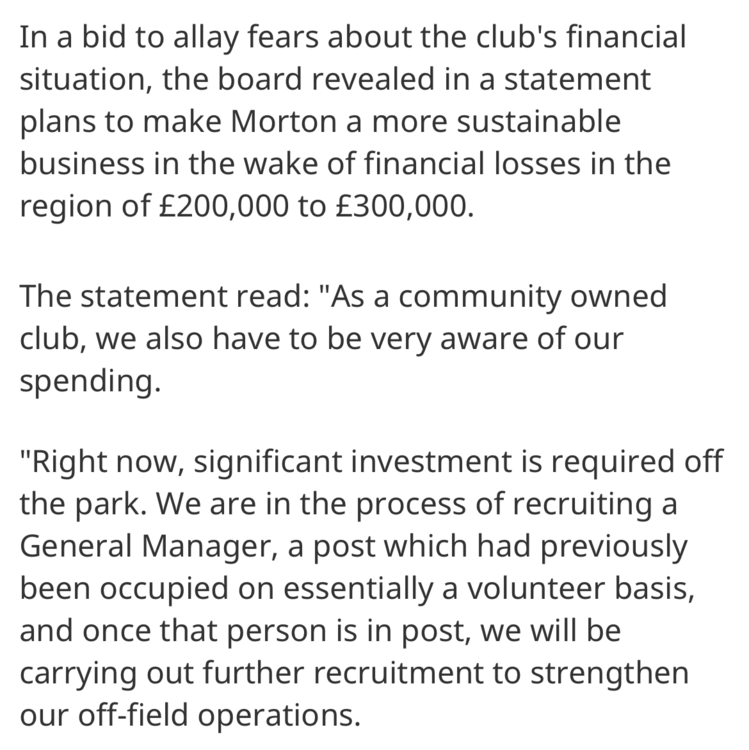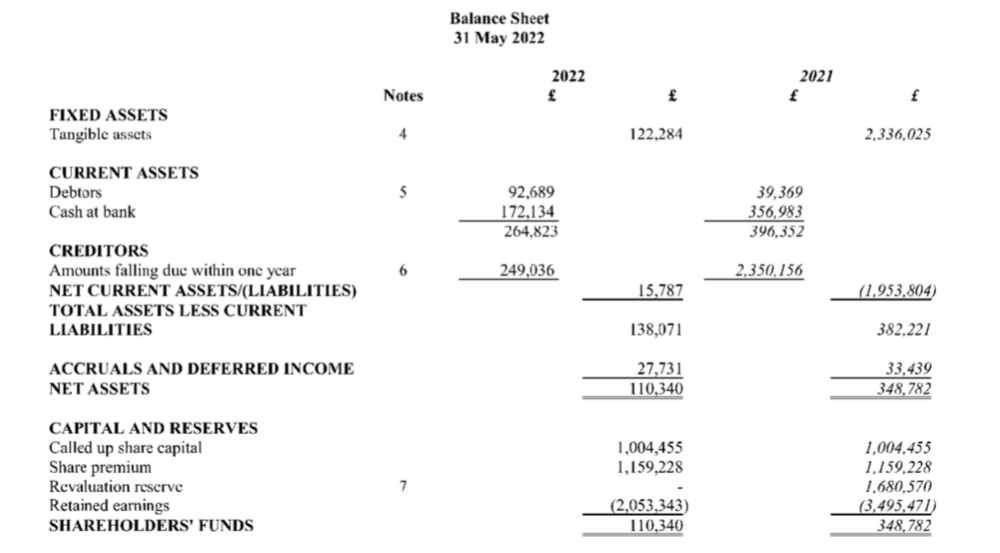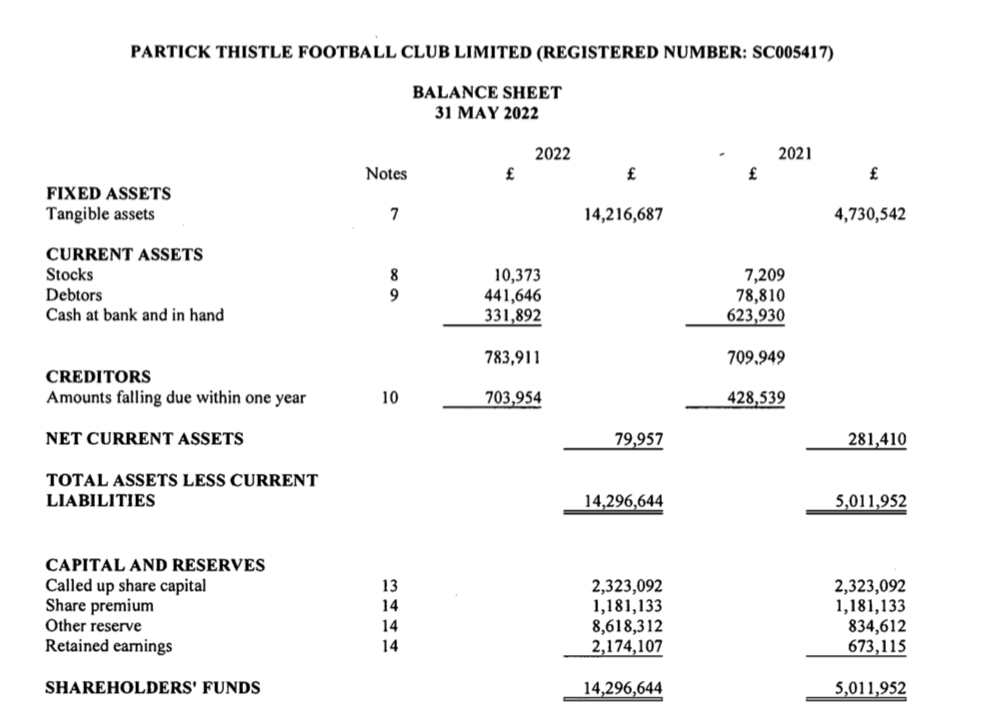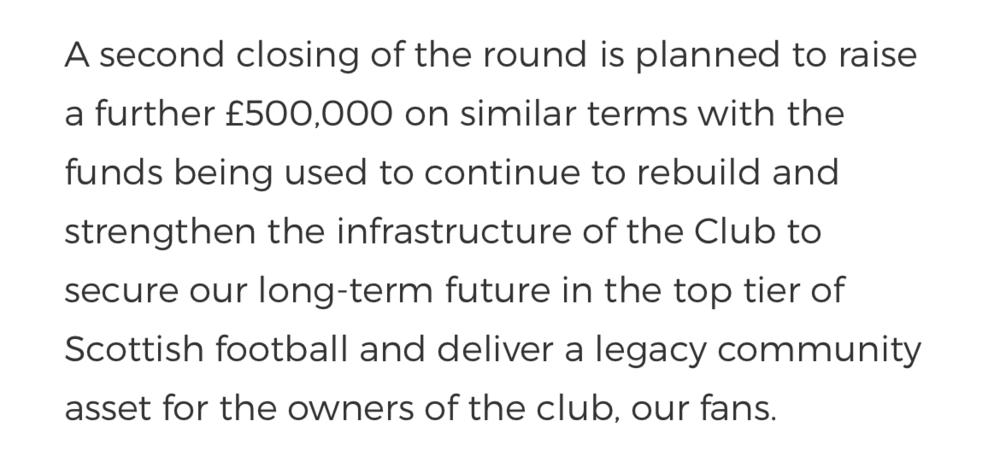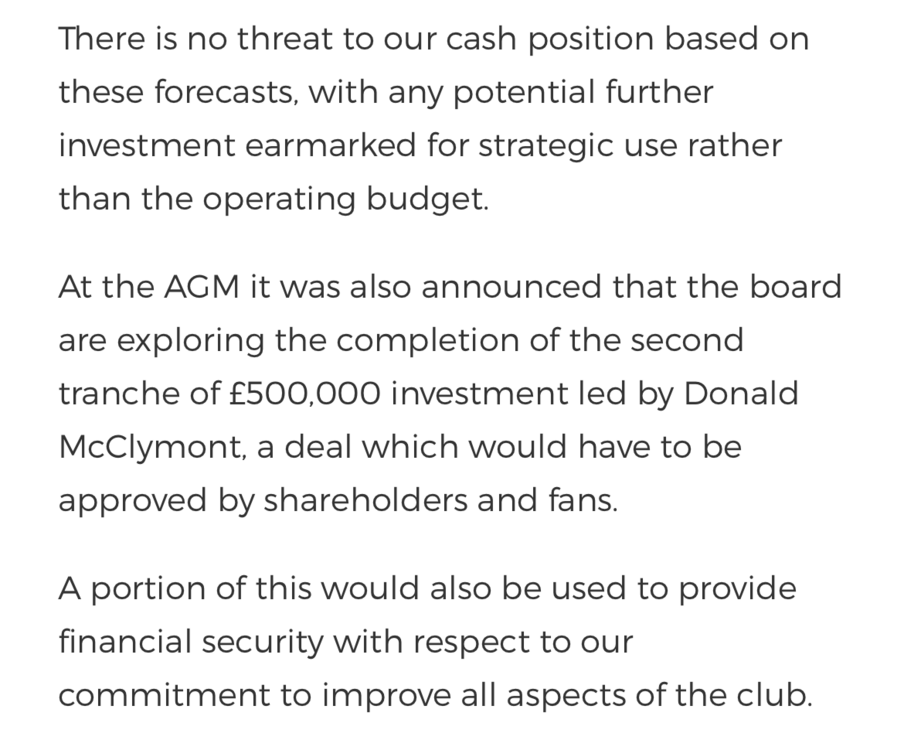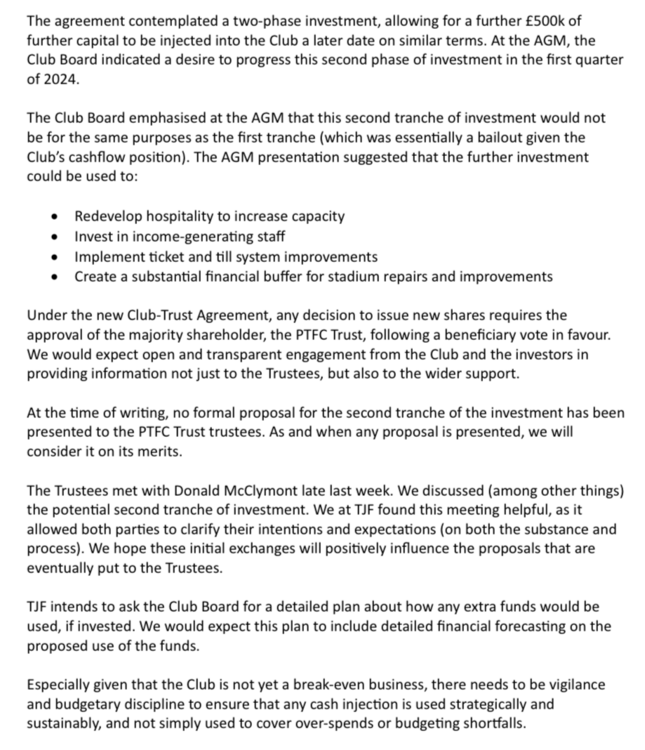-
Posts
3,580 -
Joined
Content Type
Profiles
Forums
Events
Blogs
Gallery
Everything posted by Woodstock Jag
-
Jim asks about “how Morton are doing it”. The short answer is that they sustained six-figure losses last season and the year before that. Just like Thistle did. The exact quantum for 2022-23 will be revealed soon (their accounts are due shortly) but this is how the Greenock Telegraph reported it in September: Morton also had a lucrative cup tie against Celtic at Celtic Park last season, so it looks like their “budgeted” performance may well have been similar to our own. Morton, of course, relied on a two million pound write-off from the departing Rae family in 2021 to make their fan ownership implementation able to happen. As to whether Morton required a bailout on cashflow: they may well have done. That said, they drew Rangers at Ibrox in the League Cup this year, which I’m sure will have helped. Their cashflow position wasn’t in great nick (and quite similar to ours) at the end of the 2021-22 season: (Morton 2021-22) (Thistle 2021-22) Morton is also differently structured than Thistle (for example Cappielow is owned by a separate company), and run a smaller first team squad than we do. If I had to guess (it’s not readily apparent as their accounts are less detailed) I’d say they’re probably a lower turnover company with lower fixed off-field costs than Thistle, Cappielow being a dump. So if Jim’s point is that Morton are probably doing slightly better in footballing terms than their finances would suggest they should, and that Dougie Imrie had a jammy cup draw record, then yeah, no arguments here.
-
The Club does not “require” another £500k.
-
The possibility of a second tranche of investment has been prominently advertised: (a) at the point the original investment was completed on 5th October 2023 (b) at the Club’s AGM on 11th January 2024, which Jim attended (here is the slide from the presentation pack, which Richard Beastall specifically spoke to on potential uses for tranche 2) - the forecasts presented to shareholders also indicated that the cashflow of the business would remain positive even without the investment. (c) in the Club’s post AGM update of 16th January 2024 (d) in TJF’s AGM summary report, published on 22 January 2024. So I hope anyone given the impression that this potential investment was somehow subtly released to fans at the back of the Census report is quickly disabused of that notion. Having attended a meeting of the Trustees on Monday 12th February I can confirm that no second tranche proposal has yet been presented to the Trustees. As and when a proposal is presented, we will consider it on its merits, ask more detailed questions and for further information (including financial), and then come to a view. That view will be set out in public for all PTFC Trust beneficiaries to consider, and no investment will go ahead without a prior vote to approve it from the 2400 plus beneficiaries of the PTFC Trust. We will not be taking lessons in diplomacy from those who would have us pre-empt this process. The ultimate decision is not one for us to make: we are simply a set of custodians representing the interests of the fans who will themselves decide if any further investment is desirable, and if so on what terms.
-
Just a quick update to say thank you to all the beneficiaries who got in touch about the draft Club-Trust Agreement during the consultation phase. We had a Trustees meeting yesterday evening to discuss the feedback and have reverted to the Club. Our aspiration remains for this to be signed and put into force later this month, but we'll keep you posted.
-
The results from the TJF Census are now published, together with a report providing (hopefully) a pretty comprehensive update on the key priorities raised by members in late October/early November. https://thejagsfoundation.co.uk/tjf-census-results/
-
Three observations: 1. The efforts to keep the Youth Academy going were specifically at the urging of the current management team 2. The community links of an Academy are not solely concerned with the community football initiatives 3. Whilst a cost-benefit analysis is absolutely a sensible thing to do (and sustainability work has been ongoing for several months now at the Academy) it's an odd thing to call for if someone has already made up their mind that it isn't affordable. Surely it's precisely that exercise that will determine whether that is the case?
-
The honest answer is that I don't have those sorts of numbers to hand and it depends. The main costs are (a) staff and (b) facilities - the costs of these vary drastically depending on whether there is overlap with the Club and/or the terms on which facilities can be accessed. The corporate structure also impacts access to things like grants. tl;dr it's quite complicated and not my area!
-
The key benefit is a conveyor-belt of talent that generates (at least initially) inexpensive first-team players and/or transfer and sell-on fees further down the line. I understand that, across Liam Lindsay, Kevin Nisbet, Aidan Fitzpatrick, James Penrice and others, the Academy has (there or thereabouts) generated revenue for the Club well into 7-figures. The sell-on fees and training compensation payments can get really quite substantial if a player goes on to bigger and better things. Worth emphasising that, at the moment, the Club does not pay to run the Academy. After exhausting the (extensive) capital put in by Colin Weir, the Academy is being funded mostly by a benefactor, partly by sponsorship and partly by the new TJF pledge, this season. There are legitimate questions about how to make the Academy sustainable to fund in the longer-term, but as indicated in the TJF consultation on the pledge, the Club simply wasn't in the position to commit financial (or major administrative) support to it back in the summer. Unless a decision is made to make savings elsewhere in the Club's budget, I don't anticipate this changing. The solution will therefore need to find a way of meeting costs in the short-term and an equitable way of splitting income from graduates sold-on in the longer-term. Without the intervention of the benefactor in late summer, let's be clear though: there would be no Thistle Weir Youth Academy still in existence.
-
About £300k of it was gone before 3BC bought the Club anyway. And about £200k of it was sitting in the company at year end 2021-22 (plus some non-cash assets). I’d guess a significant six figure sum has also gone on duties, professional services and other administrative fees. And as I said earlier, at least £530k went into the Club directly in the 2020-21 season. But the Club accounts (to me) aren’t entirely clear exactly how that money went in and was accounted for at the Thistle end.
-
Zero. The £1.3 million was the sum paid to existing shareholders to acquire the majority shareholding. The £1.7 million was a sum paid to a property company for two bits of land, which were (after considerable delay) gifted back to the Club. The Club did not receive any of the money given to the property company (despite being a shareholder in it) because the people who put the capital into the property company in the first place had a preferential distribution.
-
It was £4.9 million (as a soft loan, for working capital) and it eroded as follows: A few hundred grand went into activities preceding the acquisition of the Club (likely connected to the ill-fated training ground) £1.3 million of it went into buying the majority shareholding in the Club (for which there will also have been, probably, six figure professional advisory and other costs) £1.7 million of it went into buying the Main Stand and Bing from Firhill Developments Limited (plus advisory and other costs) £800k of cash was burned through during the 2020-21 COVID season (of which at least £530k is explicitly recognised as having been committed to 3BC’s only subsidiary, the Football Club). Without those commitments, and without furlough and other grant income, the Club would have lost about £1 million that year. Further professional advisory and other admin costs appear to have reduced the cash pot of 3BC further in 2021-22. This coincides with a season in which the Club had operating losses of more than £200k, but it also coincides with the transfer of the Main Stand and Bing back to the Club. And now 3BC no longer exists, so we will never properly know its financial activity in 2022-23.
-
“You’re not allowed to count reliable and repeatable six-figure income from the Club’s core customers! That’s cheating and doesn’t suit my argument and agenda!”
-
This wasn't aimed at you! A lot of the good ideas that have come out (for example in this thread) are fundamentally ones for the Football Club (and at that, ones that have logistical, practical and resource implications) rather than for TJF. But there are several examples on this thread of one individual in particular trying to blame TJF for things that fundamentally just aren't our responsibility, and which show a total disregard for the model of "fan owned, not fan run".
-
I should stress that, despite my frustrations on here sometimes, it is a rewarding thing to represent 1650+ fellow Thistle fans. The key challenge is not placing all of the burden on a very small number of people, because otherwise, bluntly, they'll burn out. It's why I was delighted that we were able to bring Derek McLeish on board at the turn of the year after Sandy stepped back, because running a successful members' organisation at the heart of a fan ownership arrangement is difficult even in the most benign of environments. New energy and ideas to relieve the battle-weary is a good thing. TJF has had to deal with some absolutely extraordinary, bizarre, irrational and chaotic behaviour from other people in positions of power in the last 4 years. It has had to try to exert influence first from completely outside the tent and then from (underappreciated) minority positions inside of it. It's incredibly easy for people to criticise, or to insist from the outside that things are somehow "simple" when they almost never are. It would just be nice if those same people volunteered practical solutions to deliver things in ways that would be remotely acceptable to the key stakeholders involved, instead of just declaring that some outcomes would be desirable and providing absolutely nothing by way of a plan to deliver it. There will be some people that TJF, the PTFC Trust and the Club Board can never keep happy. They revel in having a grievance with zero responsibility. The challenge is to ensure that their negative energy doesn't get in the way of achieving positive things. Consistently, I find that the most vocal armchair critics give very limited to no consideration of who fills the void in organisations if the people already there leave. Or put another way, they should be careful what they wish for or they might get it.
-
This post has very neatly encapsulated how you deliberately misconstrue and twist things to suit your agenda, accusing people of saying things they clearly haven't said. It is profoundly bad faith on your part to suggest that I was somehow "questioning" whether the female toilets should be upgraded. I will simply make three observations: (a) No one here has questioned whether the female toilets should be upgraded - they should. I made a separate observation about the provision of hot water in all toilets, which the Club has previously ruled-out installing on grounds of cost. (b) No one on here has said that the hospitality lounge should be a higher priority than toilets You have inferred that from the fact that the Club has spent some money doing the lounges up. You have absolutely no idea whether they plan to make major improvements to the toilets facilities (whether those for women or for anyone else) because you haven't even asked them. (c) Despite pronouncements (or in your terms, "PR-exercises") on sanitary provision by the previous board, if you actually spoke to any female fans you would know that last season there was a persistent problem with supplies running out and not being replenished. Her Game Too raised this with Beth at the Club shortly after they formed at Thistle and the result was consistently better-stocked sanitary provision in the women's toilets in both stands. Not PR-exercises: practical results.
-
Absolutely. Facilities, including the toilets, are an important part of the picture. For what it's worth, I know that some work has actually been done this season on the toilet facilities, but this was largely a tidy-up and paint-job. The Club has quite a small facilities team (including volunteers) but they've made some really good progress in places this year. Edit: I should add here that although Jim makes snarky references on here to the Her Game Too presence and interventions at the Club, they were actually responsible for addressing a long-standing problem with the women's toilets in terms of getting the Club to include properly stocked sanitary facilities. It's an important reminder of the direct influence that fan groups and fan activism can have. For the benefit of those who weren't at the AGM, questions were specifically asked about facilities and stadium maintenance (by The Jags Trust, the Trustees agreed to split the themes of our questions between us to cover as much of what had been brought to us by the fans as possible). The CEO, Chris Ross, explained that the Club has a rolling list of key facilities priorities (with safety compliance essentially being top of the list). For example, there has been a rolling programme to replace or fix broken seats in both stands over the course of this season. Proper renovation of facilities has up-front cost implications, and when you're a Club without a significant cash buffer, it's difficult to commit to more ambitious projects. The lack of hot water in the toilets is one that's come up before (indeed, it's come up at previous AGMs) and the reason for not doing it has always come down to the cost being very substantial to install it. This is where fan ownership comes in in terms of helping to shape priorities of the Club, but also identifying people and businesses within the Thistle community who can help. Improving facilities was something that came up time and time again in the TJF Census survey, which we're hoping to get the results out on soon. It'll also be one of the things we seek to do follow-on consultation on in conjunction with the Club, so that there is a better sense of what fans think is more and less important to their match-day experience.
-
I'll be the first person to admit that TJF has made some mistakes along this journey. But I hope this exchange illustrates the sometimes impossible position that TJF were put in at various points. It's extremely easy for Thistle's armchair generals, some of whom (like JJ) aren't even TJF members, to be gung-ho about what they would have done in our position. They didn't have to build the relationships just to get in the room, let alone to get some influence over either the Trust or the Club Board. They didn't have to manage the expectations of many hundreds of fans, most of whom were giving an overriding message of urging TJF to be pragmatic and to make compromises on their behalf in the interests of unifying the fanbase. If you think you can do better, stand for the Club Board representative positions later in 2024. Stand for election to the TJF Board. Your success will be everyone's success.
-
TJF, and others, wouldn't have been given access by the Club Board to the detailed financial information necessary to facilitate: the financial disclosure people like you were (correctly) demanding throughout the first half of 2023 any meaningful investment process, without which the Football Club would have become insolvent and defaulted on player wages A bi-product of this could also have been that the PTFC Trust and TJF didn't build-up a trusting working relationship over that period. The consequences of that could have been that the fan ownership roadmap fell through. Causing massive instability and uncertainty at the football club while Doolan was trying to get us into, and then through, the play-offs. It's very easy to be against NDAs in the abstract. We didn't like that Sandy and Andrew needed to sign them. But they were the price that had to be paid for disclosure and to get in the room to be part of the solution.
-
The NDAs were signed (according to my records) some point between January and February of 2023 (I don't have the exact date to hand). They were entered into by two individuals that were not, at that point, Directors of the football club. Therefore they were not bound by the general obligations of confidentiality of directors. Obviously Andrew subsequently joining the Club Board in mid-June changed his relationship with the Club, to a much cleaner one with directors' duties. Are you suggesting that the Club should have shared confidential financial information with third parties which, at that point, had no legal relationship with any shareholding in the football club and no representation on the Club Board? Not having a go here; I'm genuinely asking here as I do not understand what point you are making. Just because the Club is a small business doesn't mean that there aren't really obvious commercial sensitivities around aspects of its financial position. The purpose of those NDAs was to facilitate the sharing of confidential financial information beyond the Club's Directors and CEO. Without it, TJF (and others) would not have received any of that information. The financial disclosure exercise that happened in June would have been entirely on the initiative and terms of the Football Club Board. TJF would have been completely unable to provide additional insight and commentary in a timely way. We'd have had to rely exclusively on the draft Accounts published a few weeks ago, some six months after the fact, just like everyone else. What should have been done differently?
-
No I haven't. Who signed NDAs? As we have said, several times, the two individuals who signed NDAs are Sandy Fyfe (no longer a TJF director) and Andrew Holloway (still a TJF director). Those were signed in the context of the process of financial disclosure and investment proposals, when it became clear in late 2022/early 2023 that the old Club Board's presentation of the financial position was considerably at odds with the reality. They (and various others involved in investment discussions) were given access to financial information under NDAs that would not normally be put in the public domain for reasons of commercial sensitivity (management accounts, for example). TJF deliberately confined this exercise to NDAs for only two directors precisely so that the rest of us could speak more freely if needed. Other confidentiality obligations Additionally, Andrew Holloway was privy to information in his capacity as a Club Director, which would not otherwise have been available to him. As with any director or former director of a company, he owes continuing fiduciary duties in respect of confidential information, including commercially sensitive information, which would only be shared by the Club by express agreement. The same also applies to Stuart Callison, who has as of less than 4 days ago taken on the position of Club Director. It should therefore be obvious that the rest of the TJF Board has less information about the day-to-day financial decisions of the Football Club than those on the Club Board. That is entirely appropriate in a fan-owned, not fan-run Football Club. Greater information sharing There will be some information the Club has to share with the Trustees, under the Club-Trust Agreement, which it is currently under no legal obligation to share. This includes: the draft budget, strategic plan and business plan (from season 2024-25 onwards) any contract of quantum greater than £50kpa (excluding playing staff) any major proposals to borrow (whether secured or unsecured) otherwise than in the ordinary course of business any proposal to buy or sell land, or take out any lease of greater than 5 years the prospectus of any proposal to issue new shares This provides the governance structure that makes budgetary and long-term financial accountability credible and sustainable.
-
A quick Google away: Average Home League attendance 2022-23: 3127 Average Home League attendance 2023-24 so far: 3470 An 11% improvement. Nuff said.
-
I honestly give up with you Jim. There is no point in me engaging with you because you repeatedly ignore or misunderstand the context in which comments are made. You personalise and catastrophise absolutely everything. You’ve already made your mind up about people, some of whom haven’t even been in the door three months. You’ve misrepresented the nature of TJF’s support/opposition and involvement in decisions. You’ve repeatedly said things that have turned out not to be true, or to be a very incomplete account of what actually happened. You’ve swallowed hook line and sinker a bizarre interpretation of “the German Model” which was literally a term of phrase used to describe a new legal protection of the majority shareholding that didn’t exist before. 51% is a floor, not a target, for the fan ownership shareholding. Any dilution will be voted on by the beneficiaries and will not happen if they object. You are, quite simply, lying when you say that “TJF have no questions to ask”. We literally asked a detailed question at the AGM, on the thing you are concerned about. You didn’t like the answer given to that question. We haven’t said anywhere what we think of that answer. You are, as always, jumping the gun and assuming the worst in people. It is infuriating that you cannot see how the situation is different in January 2024 than it was in November 2022. TJF (a) has Club Board representation (and therefore that person has access to confidential financial information including the management accounts of the company (b) is a trustee of an organisation that has the majority shareholding and (will shortly) have a legal agreement in place governing budgetary and spending approvals. Precisely none of this was in place in November 2022. The presentation to shareholders was described by someone sitting next to you at the AGM as like “night and day” compared to what the Club Board offered at the previous one. This was a shareholder who made an excellent point about the lack of due diligence done before the share transfer. That was a fair and balanced account of what happened at the AGM. Yours is not. Frankly it is utterly exhausting and not a good use of my or anyone else’s time trying to engage with you on this, because the kernels of legitimate points on longer-term sustainability are lost in a web of inaccuracies and preconceived notions. TJF funding of the Club is not the full answer (no one has suggested it is) but it is making a substantial material difference and is an entirely legitimate component of sustainably funding a fan owned football club. If you don’t believe this, you’re frankly in the company of Jacqui Low and Peter Shand, who made clear to TJF in the summer of 2022 that the Club neither needed nor wanted fan fundraising to be a part of the budget.
- 267 replies
-
- 15
-

-

-
Okay I’ll quantify each use of the phrase “non-trivial”. TJF money is a gain this financial year compared to last of over £170k. According to the draft accounts, getting sponsorship back to 2021-22 levels would raise an extra £60k in the income column. And according to the presentation given to shareholders at the AGM, the spend on the management team is projected to be down this season by a significant sum (a large five figure sum). They are therefore “non-trivial” because they materially change the position in terms of the size of the deficit being run. Delivering on those three things alone plausibly could address as much as half of a £600k+ deficit, and that’s before you get into late phasing of playoff income, substantially higher season ticket sales and any gains to have been made in other parts of the business.
-
It is important to stress that the Club is not carrying "residual debt". This phrase is apt to mislead people the way it is being used by some on here. Soft-loans were made by directors to ease the cashflow position of the Football Club last year, which is why the cash-in-the-bank was actually significantly higher at year-end 2022-23 than in year-end 2021-22. The key point for cashflow is not where it is at year-end, but where it is at its lowest point in the season. If that goes negative at any point in the season, there's a real risk that bills don't get paid, and you're technically insolvent. This is true even if you are running a break-even budget, or even one that operates at a modest profit. Those loans entered into in the second half of the season in 2022-23 did not appear as operating income in the accounts, and repaying them does not count as operating expenditure. They are irrelevant to the profitability of the football club. That they were needed was a symptom of an erosion of the margin of safety, and that erosion was caused by the Club operating substantial operating deficits across several years. But they are a distraction from the forward-looking picture. As LenzieJag correctly points out, what the loans affected, in the short term, was the margin of safety: whether there is physically enough cash in the bank to meet payroll, trade creditors and other costs of the business at any given point in the year. The primary purpose of the investment is to alleviate cashflow issues in a more stable long-term way than soft-loans, which are repayable on demand. Jim is correct that, if the Club runs sustained losses over several seasons, the benefit of this kind of cash injection would evaporate and you would be back at square one. It is legitimate, in the context of tranche 2 of the investment (which was contemplated at the outset and communicated to fans at the time of tranche 1) to ask how much of that money is actually going to go into strategically useful outputs, rather than just plugging losses. Those are questions that TJF and the Trustees will be asking as and when the detail of any proposal is put to us. If the answers aren't credible, we will say so. And we will say so in advance of a beneficiary vote taking place. It is an entirely reasonable question to ask about whether credible efforts are being made to bring the Club to a sustainable break-even business. But the scale of the task was absolutely massive after last year, because there was no breathing space to restructure the business in a credible and sustainable way. Jordanhill Jag would have you believe that it's possible to turn Partick Thistle into a break-even business while sustaining a competitive team on the park at the drop of a hat, after (by his own admission) it essentially ran a £600k deficit last season absent a favourable cup tie. That isn't, in my view, a credible position. These things take time, and are done incrementally. The Club has taken some steps to ensure both that it gets more income and that more of that income is predictable, repeatable and sustainable. There is obviously the TJF money that is a non-trivial part of that. Season ticket sales are also drastically up, and at a higher price-point (as LenzieJag pointed out). There is some (though not much) income from last season that for reasons of timing will be reflected in this year's accounts. Collectively, this put a substantial dent in the shortfall that would otherwise have arisen this financial year, absent unpredictable sources of footballing income. As I pointed out at the AGM in my question to the Directors, sponsorship revenue fell by 20% between seasons 2021-22 and 2022-23. The Club can close a non-trivial part of the operating losses gap by rebuilding sponsorship to 2021-22 levels and beyond. We've seen some steps towards that already, with the Wyre Stadium naming (for example) that has no equivalent in the 2022-23 accounts. Some of our sponsorship deals are legacy and multi-year. When they expire, there is the opportunity to remarket those at a significantly higher annual price point. The proof of the pudding will be whether this Club Board is able to realise the potential growth in this area. I understand it is an area Donald McClymont is keen to become involved in, as he alluded to in his video with the fans. This financial year, the costs of the management team are expected to be non-trivially lower. This is partly because, in the second half of last season, there was a period of gardening leave for a (three-person-strong) group. Kris Doolan doesn't have two assistant managers; only one. The figures at the AGM support the view that there is a significant saving there. Ultimately I will leave it to others to judge whether the Trustees and TJF are being robust enough with the Club Board. We actively requested that members get in touch with questions ahead of the AGM and only one member actually asked us to ask specific financial questions. Those questions were (essentially) addressed by the presentation provided by the Club, and I then asked as best I could a follow-on question about reliability of forecasts. But I would just also observe that we are in a very different place from late 2022, when even the majority shareholder, let alone the fans more widely had absolutely zero people in the boardroom. Robust public exchanges happen when there is no opportunity to ask those questions in any other forum: when the Club isn't talking to you. TJF's understanding of the underlying finances of the football club was significantly improved when Sandy and Andrew signed NDAs in early 2023. But the fact of having signed those NDAs (for reasons of commercial sensitivity) inevitably meant that they could not ask questions publicly in the same way as when they were a group of outsiders with no inside information. We had to work with the Club to agree a process of financial transparency, which is what you eventually saw in the summer. Similarly, Andrew, and now Stuart C, have had/now have (respectively) legal obligations as directors of the football club, but with that also comes the opportunity to see much more detailed financial information than a protest group outside the tent. The most effective forum to challenge any rogue forecasts, cost control or revenue growing strategies is, for now at least, the Club Boardroom. And when the fan elections take place later this year, there will be directly accountable voices to the fans involved in that scrutiny. And under the CTA there will be more opportunities for the Trustees externally to scrutinise and question the credibility of the 2024-25 budget before it is set (as it requires their approval).
-
I would add to this that our Conference League consultation was a direct response to members contacting us about it, and the results of that survey led directly to the Club Board adopting a position opposed to those changes.



